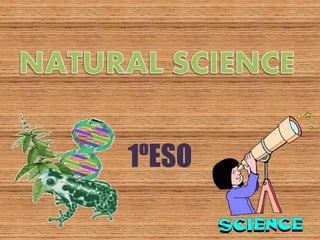Introduction 1?
- 1. 1?ESO
- 2. ? What will we learn? UNIT 1 THE EARTH IN THE UNIVERSE ? UNIT 2 LIVING BEINGS AND THEIR CLASSIFICATION: INVERTEBRATES ? UNIT 3 THE ANIMAL KINDGOM: VERTEBRATES ? UNIT 4 BIODIVERSITY I: PLANT KINDGOM, FUNGI KINDGOM. ? UNIT 5 BIODIVERSITY II: MICROORGANISMS. MONERA AND PROTOCTIST KINGDOMS. VIRUS. ? UNIT 6 MINERALS AND ROCKS ? UNIT 7 THE EARTHĄŊS CRUST ? UNIT 8 MATTER . ATOMS, MOLECULES, COMPOUNDS ? UNIT 9 STATES OF AGGREGATION OF MATTER. KINDS OF MATTER.
- 3. How will we learn it? ? Presentation of the unit PRESENTACI?N ? Work sessions. TRABAJOS DE AULA ? Consultation or brainstorming sessions. PUESTA EN COM?N
- 4. ?What do we need? ? WebBook yteach and Blackboard ? Notebook ? Laptop ? Use your planning sheet and diary!!! You will know what you have to study and which activities to do each day. ? Laboratory booklet ? Make most of your time in class, and you will have less homework.
- 5. ?Assessment ? EXAMS ? ACTIVITIES: notebook. ? PROJECT: one for each unit. ? ORAL PRESENTATIONS: At least two each year, based on one of your projects. ? REINFORCEMENT ACTIVITIES.
- 6. Laboratory ? We will have a weekly class in the lab. ? Seats and groups are assigned. ? LABORATORY ASSIGNMENTS AND ACTIVITIES: At least one each for each unit. ? LABORATORY REPORTS for each activity.
- 7. ? Laboratory activities will be a VERY IMPORTANT part of your grades this year, take it seriously. ? BE RESPONSIBLE IN THE LAB, IT IS NOT THE PLAYGROUND. There is fragile potentially hazardous material, plus the whole school has to use it
- 8. Assessment ? Will be CONTINUOUS, every day and every activity counts. Exam Project Laboratory activities Blackboard tests, activities (notebook) and WebBook activities Classroom grades (includes your behaviour)
- 9. Assessment ? The assessment in Natural Science will be based in the following MYP criteria. Each criterion will be assessed in every term.
- 10. CRITERION MYP criteria Meaning TASKS MAXIMUM LEVEL ACHIEVED A: ONE WORLD How is science Projects, oral 6 applied to solve presentations, problems in life class debates and society. B: Use of appropriate Projects, oral 6 COMMUNICATION scientific presentations, IN SCIENCE language. exams, unit exercise booklet, classwork. C: KNOWLEDGE Understanding of Exams, unit 6 AND the main scientific exercise booklet, UNDERSTANDING ideas and classwork. OF SCIENCE concepts learnt.
- 11. CRITERION MYP criteria Meaning TASKS MAXIMUM LEVEL ACHIEVED D: SCIENTIFIC Design and carry Laboratory 6 INQUIRY out scientific experiments, investigations projects. independently. E: PROCESSING Organize and Laboratory 6 DATA process data. experiments and Diagrams, tables, reports, projects, graphs and charts. unit exercise booklet. F: ATTITUDES IN Carry out Laboratory. 6 SCIENCE scientific experiments with safety and independently.
- 12. Which material will we use? ? Blackboard: complementary teacherĄŊs notes, activities, online tests. http://www.elearning.sek.es/ ? WebBook: lessons and interactive activities http://ylearn.educaline.com ? Notebook ? Planning ? Diary ? Laboratory booklet ? KEEP EVERYTHING TIDY AND ORGANIZED!!!
- 13. Which are the classroom rules? ? No speaking when the teacher is giving a lesson, raise your hand. ? Do not speak loud. ? Speak politely ? Do not eat in class. ? Participate as much as you can. ? Pay attention and make most of your time. You will have less to do at home
- 14. Which are the classroom rules? ? Keep your material and desk tidy. ? Respect delivery dates. ? Be punctual ? Make sure you bring all the required material. ? Dress properly.
- 15. If you break the rulesĄ 1 point ? Minus points: 5 points? loss in the next exam. ? Name on board?detention during break ? Report to your tutor. ? Note in diary. ? Phone call. ? Loss of credit ? Cheating during exams ? 0














